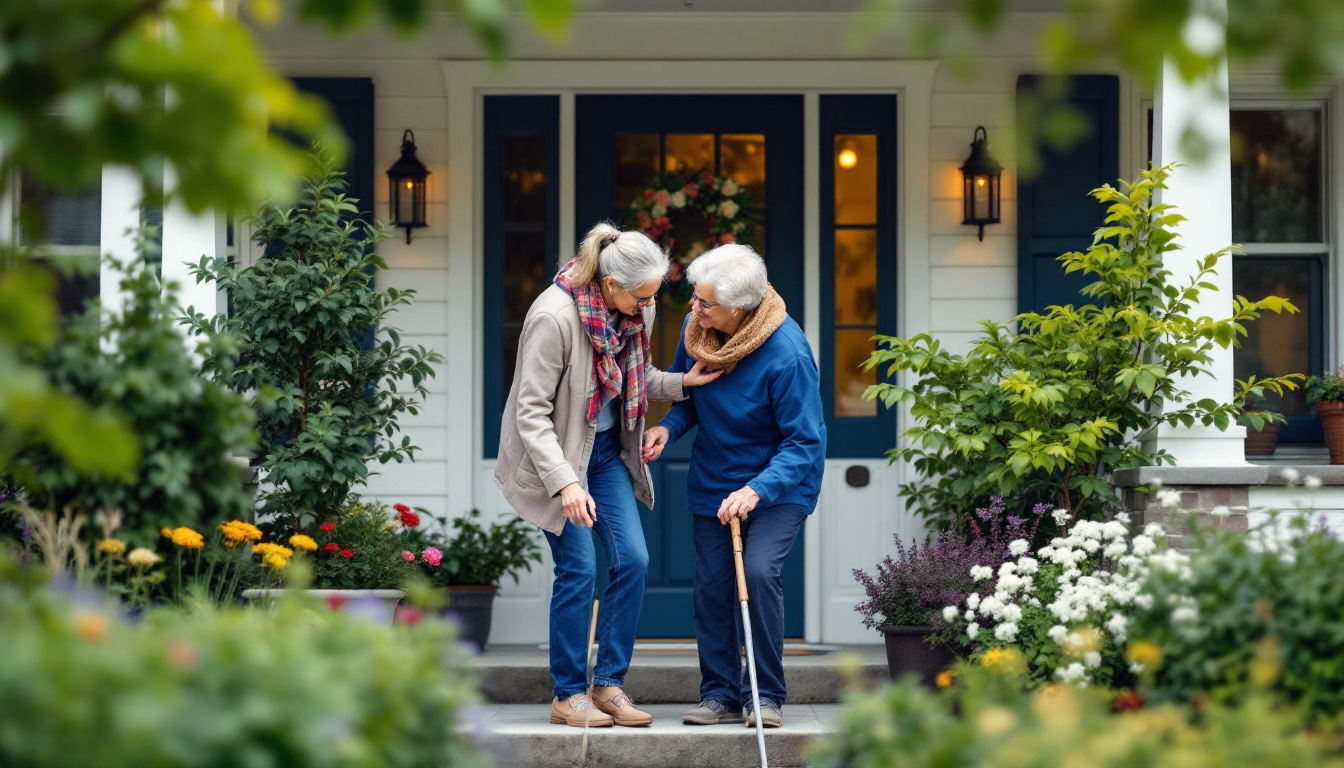Exploring Volunteer Opportunities for NYC's Elderly
Discover rewarding volunteer opportunities for NYC's elderly population. Make a difference, create connections, and find fulfillment today!

Volunteer Opportunities in NYC for the Elderly
If you're looking to make a difference in the lives of the elderly population in New York City, there are various volunteer opportunities available. Two common avenues for volunteering in this area are community centers and nonprofit organizations.

Community Centers
Community centers play a vital role in supporting the elderly population in NYC. These centers provide a wide range of services and programs designed to meet the unique needs of older adults. By volunteering at a community center, you can contribute to enhancing the well-being and quality of life for elderly individuals.
Volunteer activities at community centers can include:
- Assisting with meal preparation and serving
- Organizing recreational activities and events
- Providing companionship and social interaction
- Assisting with administrative tasks
- Leading educational workshops or classes
By dedicating your time and skills at a community center, you can directly impact the lives of elderly individuals and foster a sense of community among them.
Nonprofit Organizations
Nonprofit organizations focused on elderly care and support are another avenue for volunteering opportunities. These organizations often have a specific mission or cause related to improving the lives of the elderly population in NYC. By volunteering with such organizations, you can contribute to their mission and help address the unique challenges faced by older adults.
Volunteer activities with nonprofit organizations may include:
- Assisting with fundraising events
- Providing transportation services for medical appointments or grocery shopping
- Offering companionship and emotional support
- Helping with administrative tasks or data entry
- Participating in advocacy efforts for elderly rights and well-being
Nonprofit organizations provide a platform for dedicated individuals to make a meaningful impact on the lives of the elderly in NYC. By volunteering your time and skills, you can contribute to their mission and improve the overall well-being of the elderly population.
When considering volunteer opportunities, it's important to research and reach out to specific community centers and nonprofit organizations in your area of interest. They will provide more detailed information about the specific volunteer roles available, application processes, and any requirements or training needed.
By getting involved in volunteer work at community centers or nonprofit organizations, you can actively support and enrich the lives of elderly individuals in NYC. Your contribution can make a significant difference in fostering a sense of community, enhancing social connections, and improving the overall well-being of the elderly population.
Benefits of Volunteering
Volunteering to support the elderly population in NYC not only makes a difference in their lives but also provides numerous benefits to the volunteers themselves. Engaging in volunteer work offers social connections and mental stimulation, enhancing the overall well-being of individuals.
Social Connections
Volunteering provides an opportunity to connect with others and build meaningful relationships. By engaging with the elderly community, volunteers can establish new friendships and create a sense of belonging. The interactions and shared experiences can foster a sense of camaraderie and contribute to a more connected and compassionate society.
Furthermore, volunteering can help combat social isolation, a prevalent issue among the elderly population. According to AARP, social isolation can have detrimental effects on physical and mental health, increasing the risk of depression and cognitive decline. By volunteering and offering companionship, volunteers can contribute to the social well-being of the elderly, promoting a sense of belonging and reducing feelings of loneliness.
Mental Stimulation
Volunteering also provides mental stimulation, promoting cognitive health and personal growth. Engaging in volunteer activities challenges individuals to learn new skills, adapt to different situations, and problem-solve. These mental exercises can help keep the mind sharp and contribute to overall cognitive well-being.
Additionally, volunteering can offer a sense of purpose and fulfillment, boosting self-esteem and confidence. By making a difference in the lives of others, volunteers experience a sense of accomplishment and satisfaction. This positive impact on mental well-being can extend beyond the volunteer activities and positively influence other aspects of life.
By recognizing the benefits of volunteering, individuals can realize the immense value in dedicating their time and efforts to support the elderly population in NYC. The social connections and mental stimulation gained through volunteer work not only positively impact the lives of the elderly but also contribute to the personal growth and well-being of the volunteers themselves.
Types of Volunteer Activities
When it comes to volunteering to support the elderly population in NYC, there are various types of activities that individuals can engage in. These activities provide meaningful opportunities for volunteers to make a positive impact in the lives of the elderly.
Tutoring and Mentoring
One of the ways to contribute to the well-being of the elderly is through tutoring and mentoring programs. Many older adults have a desire to continue learning and stay intellectually engaged. By offering your skills and knowledge, you can assist them in various subjects or provide guidance in areas of personal interest.
Tutoring and mentoring programs can take place in community centers, senior centers, or even in the homes of the elderly. These programs not only enhance the educational experience of the elderly but also foster social connections and provide much-needed companionship.
Food Banks and Soup Kitchens
Volunteering at food banks and soup kitchens is another impactful way to support the elderly in NYC. Many older adults face challenges related to food insecurity and limited access to nutritious meals. By volunteering at food banks and soup kitchens, you can contribute to addressing these issues.
Food banks often require volunteers to help sort and distribute food, while soup kitchens may need assistance in preparing and serving meals. Engaging in these activities allows you to directly contribute to ensuring that the elderly have access to healthy and nourishing food.
It's important to note that while tutoring and mentoring programs and volunteering at food banks and soup kitchens are highlighted here, there are numerous other volunteer opportunities available to support the elderly population in NYC. Organizations and community centers may offer additional activities such as companionship visits, recreational programs, or assistance with daily tasks.
By exploring the different types of volunteer activities, you can find an opportunity that aligns with your interests and skills while making a meaningful difference in the lives of the elderly. Remember, even small acts of kindness and support can have a significant impact on the well-being of the elderly population in NYC.
How to Get Involved
If you're interested in making a difference in the lives of NYC's elderly population, there are several steps you can take to get involved. This section will outline the application process as well as the training and support available for volunteers.
Application Process
To become a volunteer for organizations that serve the elderly in NYC, you will typically need to go through an application process. This process helps ensure that volunteers are qualified and committed to making a positive impact in the lives of the elderly.
The specific requirements and application procedures may vary depending on the organization or community center you choose to volunteer with. Generally, you will be asked to fill out an application form that includes your personal information, availability, and any relevant skills or experience you may have. Some organizations may also require a background check or references.
It's important to be thorough and honest when filling out the application form. Take the time to highlight why you're interested in volunteering with the elderly and how you believe your skills and qualities can contribute to their well-being. Treat the application process as an opportunity to showcase your commitment and dedication to making a difference in the lives of NYC's elderly population.
Training and Support
Once you have completed the application process and have been accepted as a volunteer, many organizations offer training and support to ensure that you are well-prepared for your role.
Training programs may include orientation sessions that provide information on the organization's mission, values, and the specific needs of the elderly individuals you will be working with. You may also receive training on topics such as effective communication, understanding aging issues, and handling challenging situations.
In addition to initial training, ongoing support is often provided to volunteers. This can include regular check-ins with program coordinators or supervisors, access to resources and materials, and opportunities for continuing education or skill development.
Volunteer support networks, such as online communities or mentorship programs, may also be available to connect volunteers with one another. These networks can provide a sense of camaraderie and a platform for volunteers to share experiences, seek advice, and celebrate successes.
By offering comprehensive training and ongoing support, organizations ensure that volunteers are equipped with the knowledge and skills necessary to make a meaningful difference in the lives of the elderly. They also provide a supportive environment that recognizes the value of volunteers and encourages their personal and professional growth.
Getting involved in volunteer opportunities for the elderly in NYC is a rewarding experience that allows you to contribute to the well-being of this population. By following the application process and taking advantage of the training and support provided, you can make a positive impact and create meaningful connections with the elderly individuals you serve.
Impact of Elderly Volunteers
Volunteering not only benefits the individuals receiving assistance but also has a significant impact on the volunteers themselves. Elderly volunteers who actively engage in community service contribute to both community engagement and personal fulfillment.
Community Engagement
Elderly volunteers play a crucial role in community engagement. By dedicating their time and skills to various volunteer opportunities, they contribute to the betterment of their local communities. Whether it's assisting at community centers or participating in nonprofit organizations, their involvement helps create a sense of unity and support within the community.
Through their volunteer efforts, elderly individuals can foster connections with other community members and organizations. This engagement helps build stronger bonds and networks, promoting a more cohesive and caring community environment.
Personal Fulfillment
Volunteering offers personal fulfillment to elderly individuals. By actively participating in volunteer activities, they experience a sense of purpose and meaning in their lives. The act of giving back and making a positive difference in the lives of others can bring immense joy and satisfaction.
Engaging in volunteer work allows elderly individuals to utilize their skills, knowledge, and life experiences to benefit others. This sense of contribution can enhance their self-esteem and overall well-being. Volunteering can also provide opportunities for personal growth, learning, and acquiring new skills.
The personal fulfillment gained from volunteering can have a positive impact on the mental and emotional well-being of elderly individuals. It can combat feelings of loneliness, depression, and isolation, promoting a healthier and more fulfilling lifestyle.
By actively participating in volunteer opportunities, elderly individuals become valuable assets to their communities while experiencing personal growth and fulfillment. Their dedication and contributions make a lasting impact on the lives of those they serve and foster a stronger sense of community spirit.




























































































